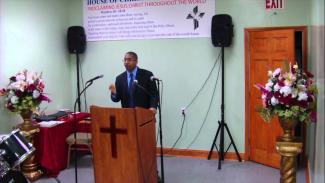Has the plan of salvation always been all inclusive? Was it always God’s plan to save the entire world, or only a select group of people? What can we learn about the plan of salvation from the Old Testament? What was the purpose of the Nation of Israel? How did Jesus fulfill the prophecies of the Old Testament? What does the Great Commission reveal about the role of the Christian church and Christianity in Jesus’ mission to save the lost? What can we learn from the parables of Jesus about how Jesus viewed salvation and the role the church should play in it?
Topic: Old Testament
To see more broadcasts select show names, a year, or all video media.How does God use people to witness in unlikely circumstances? How did God use the exiles to introduce Himself to great kings and leaders of empires? What were the qualities of Daniel, Joseph, and Esther that made them powerful witnesses for God while under the rule of those who did not share their faith? Does God use active or passive witnesses? Should one's witness be a formal Bible study series or scattered over time? What can we learn from these examples about sharing our faith and doing evangelism?
What can we learn about missionary activity from the story of Jonah? What kind of missionary was Jonah and how did he respond to his calling? Do missionaries have flaws? What does God's pursuit of Jonah tell us about salvation and who God desires to save? Why was Jonah reluctant to go to Nineveh? In what ways are we very similar in attitude to Jonah? This week we explore the story of Jonah from a missionary standpoint and learn how God shows compassion on the repentant and how His judgments are conditional.
In the story of Namaan and his leprosy, who was the unlikely missionary? What can we learn about salvation and outreach from this example? Why does Elisha have Namaan dip in the Jordan River 7 times? How does this story portray faith, obedience, and transformation? What did being saved by grace mean for Namaan and how did he respond to God's grace? What are the prerequisites for seeing the mighty works of God? This week we explore the little that is said about an unlikely missionary that had a huge impact on Namaan and his encounter with Elisha.
What can we learn from Abraham's experience? As the first Biblical missionary, Abraham's journey tells us many things about how he witnessed for God through his life and through many of the challenges he faced. Abraham is known as the father of faith, yet was he always a champion of faith? Did Abraham have weaknesses as people do today? If so, how did Abraham learn to trust God over time? What lessons did Abraham learn that are still important lessons for us to learn today? Why was Abraham commanded to leave his father's household in the first place?
What does Proverbs say about humility and pride? What wisdom is there in being humble? This particular set of proverbs was contributed by Agur, who scholars know very limited information about. What wisdom does Agur have for family relationships? How should children relate to their parents when they get old? In what ways do the words used in these Proverbs connect with God's discussion with Job? What statements are made about God as Creator?
This week, in our exploration of Proverbs, we focus on Proverbs 26-28. Solomon has a lot to say about what lies beneath the surface. Often, people where a mask. We don't always see who a person truly is until they have a chance to show their true colors. Likewise, many only superficially understand things while not looking and digging deeper to obtain true wisdom. The fool wears the mask of wisdom, the lazy wear the mask of fear, and enemies wear the mask of friends. How can Solomon's wisdom help us to avoid being hurt by why lies beneath the masks we encounter?
This week we begin studying the book of Proverbs written by Solomon. What is the meaning of these wise sayings? Why did Solomon write them? Where did Solomon get his wisdom from? Is wisdom something to work for, or is it something given and received? What is the greatest source of wisdom and how can people obtain it today? Is there a difference between worldly wisdom and heavenly wisdom? As we begin our study on the book of Proverbs we will look at Solomon's call to wisdom and tackle many of these questions.
What was the relationship between Christ and the law of Moses? Did Jesus keep the law of Moses? Was He familiar with ancient Jewish traditions? What role did this law play in Christ's life and upbringing? We explore these questions in this week's study.
This week we discuss law! What were the laws of Christ's day and age? Were they all the same or different? Why did they exist? How many were there? Does God want people to obey the laws of the land? In this lesson we not only discuss God's law, but the other laws that effected people' lives in Christ's day.












